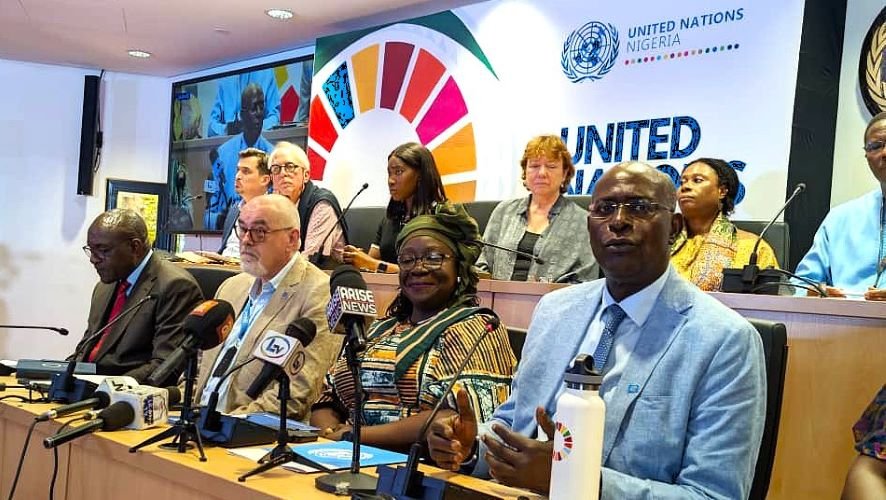The United Nations (UN) has reiterated its commitment to helping Nigeria achieve the Sustainable Development Goals (SDGs) and underlined Nigeria’s important role in global development efforts.
The UN Coordinator in Nigeria, Mr. Mohammed Fall, made the announcement at a press conference in Abuja to commemorate the 79th anniversary of United Nations Day.
He emphasized that Nigeria plays a vital role in the United Nations mandate, asserting that achieving the global SDG goals will not be possible without Nigeria’s success.
“We cannot achieve the SDGs if Nigeria does not achieve them,” Fall said.
Mohammed Fall
With less than five years left until the deadline for the 2030 Agenda, Mr. Fall noted the urgency of collaborative efforts, especially in light of the recent Future Summit and its resulting Future Agreement.
“This agreement highlights five strategic priorities: SDG financing for development, international peace and security, science, technology and innovation, youth and future generations, and global governance. The Nigeria we want is reflected in the agreement,” he said.
He stressed that the United Nations’ main focus is to support Nigeria across these five areas through partnerships with government agencies, development organizations and civil society.
The United Nations is also promoting long-term development projects aimed at addressing challenges in northern Nigeria.
“The United Nations is not about achieving things on behalf of people; it is about supporting people, bringing in global expertise, implementing mandates, and empowering governments to drive their own development processes. It’s about introducing neutrality. We will continue to operate in the northeast while operating in the northwest,” Fall explained.
Also read: Nigeria seeks $10 billion a year to fund SDGs
In the Northeast and Northwest, their approach combines long-term development solutions with immediate humanitarian assistance to address underlying problems, it added.
Elsie Atafua, Resident Representative of the United Nations Development Program (UNDP), spoke about the important role of science, technology and digital innovation in Nigeria’s development.
“We established what we call university ports for the first time, and by the end of this year 10 of them had been established.When you go to university, you have a space to create, you create a prototype, you can create many We will have the space to support ideas, startups, and more,” Attafuah said.
Elsie Atafua
He said UNDP wants to foster new ideas and, in some cases, create unicorn companies that advance national economies.
Mr. Atafua also highlighted climate change as one of the most important challenges, noting that UNDP is committed to supporting the implementation of Nigeria’s climate change goals.
“We support the Nationally Determined Contribution, which puts forward an ambitious climate change plan that allows Nigeria to not only reduce emissions, but link it to the country’s development.” she said.
This includes training young Nigerians in renewable energy sectors such as solar power technology to accelerate Nigeria’s energy transition.
Meanwhile, the International Labor Organization (ILO) is targeting social protection for agricultural workers, said Vanessa Farah, ILO Country Director for Nigeria and other West African countries.
“As an organization fundamentally tasked with promoting social justice, we have done quite a lot of work since 1960, when Nigeria joined the ILO,” Farah said.
He said the ILO is committed to addressing the issue of child labor and supporting innovative interventions, particularly in the area of social protection. They said they are working with farmers in the agricultural sector, particularly cocoa farmers, to help them take advantage of the social protection measures in place, particularly in accessing national health insurance.
The event concluded by celebrating the important role of the media in promoting development initiatives and fostering continued cooperation as Nigeria moves towards achieving the SDGs by 2030.

